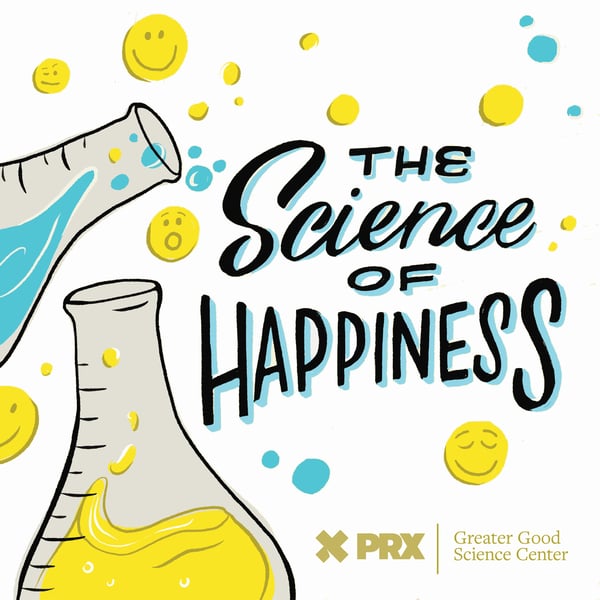Our Brains on Poetry
The Science of Happiness
PRX and Greater Good Science Center
4.4 • 1.9K Ratings
🗓️ 22 May 2025
⏱️ 24 minutes
🧾️ Download transcript
Summary
Learn how poetry can help your brain handle stress, process feelings, and spark insight.
Summary: This episode of The Science of Happiness is part of our series Using Art As Medicine. We explore poetry, one of the oldest artforms, powers our brains, calms our nervous systems, and reduces anxiety by opening doors into our psyche. Whether you're reading or writing it, elements like rhythm, metaphor and rhyme improve memory, cognition and even self-esteem.
This episode is made possible through the generous support of the John Templeton Foundation.
How To Do This Practice:
- Find Your Moment: Notice the time of day when you feel closest to yourself. It might be early morning before the world wakes up, or another quiet pocket of time when your thoughts are unfiltered and your heart is open.
- Set the Scene: Create an atmosphere that supports you. Play music that matches your mood or inspires imagination. Let it be soft and inviting, not distracting, just enough to signal to your body that this is a sacred moment.
- Choose Your Tools: Use what feels natural. Journal, laptop, scrap paper, napkin, the format doesn’t matter. What matters is that you’re ready to begin.
- Write Without Interruption: Set a timer for 5 to 10 minutes. Let your pen or fingers move freely. Don’t stop, don’t edit, and don’t worry about making sense, just see what comes.
- Welcome the Unsaid: Allow what’s hidden, half-formed, or surprising to emerge.
- Let It Be What It Is: When the timer ends, pause. Don’t rush to interpret or fix your words. You’ve just made contact with something real, let that be enough.
Scroll down for a transcription of this episode.
YRSA DALEY-WARD is an award-winning poet and author. Her debut novel, The Catch, comes out June 3rd.
Learn more about Yrsa here: https://yrsadaleyward.squarespace.com/
Pre-order her book here: https://tinyurl.com/yanw6bb5
DR. SUSAN MAGSAMEN is a Professor of Neurology at John Hopkins, and author of the New York Times bestseller, Your Brain On Art: How the Arts Transform Us.
Learn more about Dr. Magsamen here: https://tinyurl.com/33v8m5md
Read Dr. Magsamen’s book here: https://tinyurl.com/426k87f2
Related The Science of Happiness episodes:
Using Art As Medicine Series: https://tinyurl.com/k3mneupx
How Art Heals Us: https://tinyurl.com/yc77fkzu
How Awe Helps You Navigate Life’s Challenges: https://tinyurl.com/2466rnm4
Related Happiness Breaks:
How To Awaken Your Creative Energy: https://tinyurl.com/4fknd8ev
Making Space For You: https://tinyurl.com/yk6nfnfv
A Self-Compassion Meditation For Burnout: https://tinyurl.com/485y3b4y
Tell us about your experience with poetry. Email us at [email protected] or follow on Instagram @HappinessPod.
Help us share The Science of Happiness! Leave us a 5-star review on Apple Podcasts and share this link with someone who might like the show: https://tinyurl.com/2p9h5aap
Transcription: https://tinyurl.com/y9r9dyzd
Transcript
Click on a timestamp to play from that location
| 0:00.0 | I remember Roald Dahl and reading about kids that had really difficult lives and really |
| 0:11.6 | like tough circumstances. |
| 0:14.3 | And I identified with that as a child because it was the same in my house. |
| 0:18.2 | There were a lot of circumstances that were probably not the most |
| 0:21.8 | conventional and difficult. So there was something about seeing children still be able to inhabit |
| 0:29.2 | these worlds that were mystical and magical and then holding this other difficult fact of not living |
| 0:35.8 | with their parents or the parents have died or something |
| 0:38.3 | like that. So the poetry in, let's say, James and the Giant Peach, for example, was just so funny and so poignant and loaded with meaning. |
| 0:49.3 | And when I knew that you could do that, you could take the deepest parts of yourself. You could take those |
| 0:55.0 | parts of yourself that maybe you're ashamed about or maybe don't fit in with other people. That, |
| 1:00.7 | even to this day, it's my reason to be because there are so many ways in which, you know, |
| 1:07.2 | I don't feel maybe like I fit in with the world. But then when I write, it kind of translates it in a way that makes me see that we're kind of more alike than we're not. |
| 1:22.6 | Welcome to the Science of Happiness. I'm Shuka Kalentari. |
| 1:26.6 | One part of caring for ourselves that |
| 1:29.2 | often gets overlooked is creativity, how making and experiencing art can help us feel more grounded, |
| 1:36.1 | present, and connected. So this Mental Health Awareness Month, we're exploring the science |
| 1:41.6 | behind how art can be medicine. In our last episode, we talked about how visual art, things like painting and drawing, can be helpful both personally and in clinical settings. |
| 1:53.0 | Today, we're turning to something just as timeless, poetry. |
| 1:57.0 | Neuroimaging studies show that reading and writing poems light up areas of the brain connected to memory and emotional processing. |
| 2:05.4 | To share more about how poetry helps us navigate life's complexities, we're joined by award-winning poet and author, Eursa Daily Ward. |
| 2:13.4 | Later, Dr. Susan Maximum discusses what neuroscience reveals |
| 2:17.5 | about how engaging in the arts can shape our brains and bodies. |
... |
Please login to see the full transcript.
Disclaimer: The podcast and artwork embedded on this page are from PRX and Greater Good Science Center, and are the property of its owner and not affiliated with or endorsed by Tapesearch.
Generated transcripts are the property of PRX and Greater Good Science Center and are distributed freely under the Fair Use doctrine. Transcripts generated by Tapesearch are not guaranteed to be accurate.
Copyright © Tapesearch 2025.

